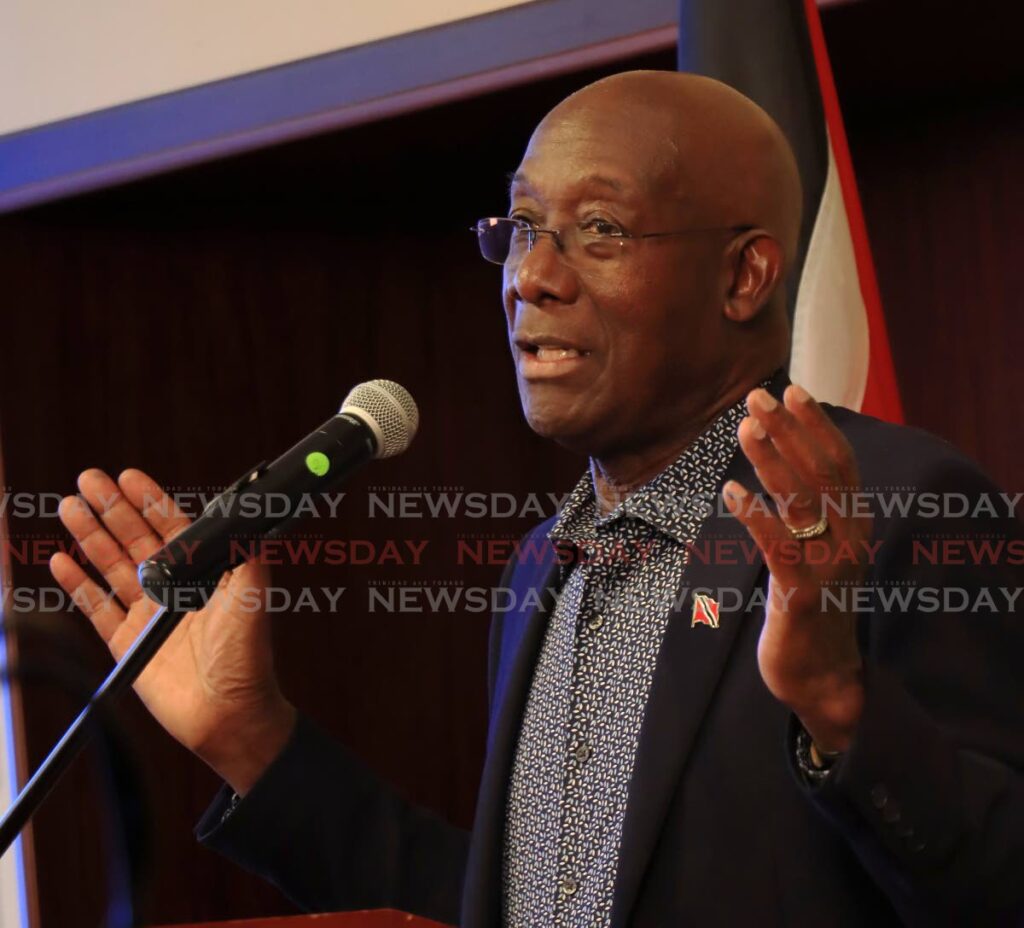Caricom governments to bring new laws to open regional market

The Prime Minister says all Caricom nations are hoping, by next month, to have all the laws in place to facilitate freedom of movement within the region.
Dr Rowley said this would fulfil the vision of the Chaguaramas treaty and the formation of the Caribbean Single Market and Economy (CSME).
Rowley was speaking at a press conference at the Piarco International Airport after his return from the 46th regular meeting of the conference of Caricom heads of government in Guyana, which he described as “historic.”
He quoted Barbados prime minister Mia Mottley, who he said was responsible for driving and reporting on “our progress or lack thereof,” with the CSME.
He said Caricom heads have now accepted that no progress will be made on the CSME without greater involvement and success in freedom of movement and the removal of internal tariff barriers within Caricom.
Rowley said Dominica proposed to Caricom that the relevant laws be considered by the end of March 2024.
He said regional leaders must now consider if, on the heels of Caricom celebrating its fiftieth anniversary, they are finally prepared to take action.
“Those of us who are in office today and those of us who are alive today, and those of us who are required to sustain Caricom going forward for the next 50 or 100 years, whether we are prepared to do what has to be done, or continue to vacillate and pussy foot and kick the can down the road, hoping that we are not called upon to pick it up.”
“Come the end of March of this year…we should ensure that our attorneys general conclude the exercises that are required to ensure that there can be freedom of movement under conditions spelt out by Caricom in such a way that a certain amount of the rights and privileges that are entrenched in the Treaty of Chaguaramas can be operationalised.”
Rowley suggested a deadline for the full implementation.
“Accept a time frame within which, whether it is seven years or ten years, that the full freedom of movement with the access to all rights and privileges within all Caricom territories be available to all Caricom citizens.”
He said Caricom leaders have accepted that enough work has been done regarding the CSME and a decision must now be made.
“A meeting is to be had between all the attorneys general to finalise this work, which is on the cusp of being finalised.”
Rowley said the hope is that the legislative aspect of the decision could be rolled out simultaneously across all Caricom territories.
“On one very special day, to be announced, all the Caricom governments, having accepted the legal work to bring about this improved access and movement, and the commitment to move forward to a date where these barriers will be removed, that all the governments of Caricom will go to their parliaments on the same day and pass the necessary legislation to bring this about.”
“The question is, do we have what it takes to get it done or do we vacillate for another 50 years?”
Asked whether the government needed the Opposition United National Congress (UNC's) support in parliament for any necessary legislative amendments, Rowley said he was unsure but believed most of the changes required only a government majority.
He said regardless of whether opposition support was needed, he hoped political bias could be put aside in deciding the best interest of the country and the long-term survival of the region.
“I would hope, even if it can be done with a simple majority, that the parliament of the country understands that, whether you sit in the opposition or in the government, this is something that we must get done because it is our effort as a country.”
“If we keep dividing our effort between who could vote for it and who wouldn't vote for it, then we'll be cutting our throat with a dull razor. This kind of thing requires parliamentarians, all 41 of us and parliamentarians in other parliaments in the region, to understand that this is not politics to win seats and to win votes. This is whether we will survive as a Caricom nation.”
Meanwhile, Rowley also praised the business footprint of TT companies in Guyana’s hydrocarbon industry.
He said TT has always had strengths in that industry despite the depletion of its oil and gas acreage.
“Over the decades, we have built up considerable expertise which is now extremely valuable to Guyana and Suriname and other countries who are engaging in a way that we had engaged a long time ago, and who are now doing seismic work, logistical support work, and so on. So I was very pleased to see the very deep involvement of the TT support sector, the technical sector in Guyana's industry.”
Rowley urged the private sector to express the same level of enthusiasm for Guyana’s agricultural industry as there is little TT presence in that sector.
He highlighted incentives available to Caricom nationals in Suriname as he encouraged agricultural entrepreneurs to consider expanding their businesses regionally.
“There are people from all over the world who are getting land in Guyana and Suriname and taking the opportunities. It was raised at the Caricom conference that there's a certain element of disappointment that we have not seen our own private sector taking the risk, leading the charge to utilise the land that is available.”
“Suriname has made available probably, I think, 3,000 acres of land for Caricom private sector people to come in and land is available for agriculture. There has not been a single taker so far. So the excitement at the level of the political directorate is not mirrored by the private sector taking up these offers, which were not on the table before.”

Comments
"Caricom governments to bring new laws to open regional market"